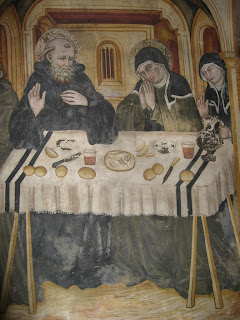
An entry from Mark Berry's 'Way Out West' blog that caught my attention and I felt needed recording so that it could be added to the conversation.
I came across this quote on the web site of "St Benedict's Table" a community in Winnipeg... they say...
At the dawn of the first dark ages, Benedict arose with a vision for community. He did it almost by accident; or is that by providence? Disillusioned by the world of academia in what was looking to be an increasingly threatened and decayed Roman society, Benedict dropped out of school and left town. He went into the wilderness, found himself a quiet cave, and prepared to spend a life simply listening in prayerful silence for the voice of God. The thing is, they wouldn't leave him alone. First by the ones and twos, and eventually by the hundreds, other young men went out to that wilderness place to sit with Benedict and to seek God in the silence. So many, in fact, that he had to give some structure to their common life, eventually producing the "Rule of St Benedict" that governed community life in a rhythm of prayer, work, hospitality, learning, feasting and fasting. Balance. Boundaries. Safety. Accountability. The communities which continued to be formed around this Rule long after his death kept alive a model - an alternative model - for human life in very, very dark times. He seems a good mentor for us in these changing times, doesn't he?
And the table? Our life is formed around the communion table, and nurtured over various tables of hospitality and conversation. Most obviously there is the coffee table at the back of our worship space, but there are also all those tables in cafes and pubs and restaurants and homes where community is built, faith shared, questions asked.
It never ceases to amaze and encourage me that communities all over the globe seeking to exist and engage in a changing/post-christian culture find a resonance in common themes... in spiritual even monastic rhythms, in eating together, in hospitality, in creativity, in history, in connections, but these communities do not seem to desire separation from the world, far from it these "rules and rhythms" have arisen out of a desire to be incarnate in the world.

No comments:
Post a Comment